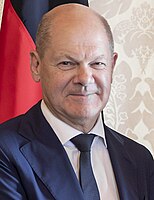
Back Kabinett Scholz ALS حكومة شولتس Arabic Vláda Olafa Scholze Czech Regeringen Olaf Scholz Danish Kabinett Scholz German Κυβέρνηση Σολτς Greek Ministraro de Olaf Scholz Esperanto Gabinete Scholz Spanish دولت اولاف شولتس Persian Scholzin hallitus Finnish
Scholz cabinet | |
|---|---|
24th Cabinet of the Federal Republic of Germany | |
| Incumbent | |
 | |
| Date formed | 8 December 2021 (2 years, 4 months, 2 weeks and 6 days) |
| People and organisations | |
| President | Frank-Walter Steinmeier |
| Chancellor | Olaf Scholz |
| Vice Chancellor | Robert Habeck |
| Member parties | Social Democratic Party Alliance 90/The Greens Free Democratic Party |
| Status in legislature | Traffic light coalition 417 / 736 (57%) |
| Opposition parties | Christian Democratic Union Christian Social Union Alternative for Germany The Left Bündnis Sahra Wagenknecht |
| Opposition leader | Ralph Brinkhaus (CDU) (2021–2022) Friedrich Merz (CDU) (from 2022) |
| History | |
| Election(s) | 2021 federal election |
| Legislature term(s) | 20th Bundestag |
| Predecessor | Merkel IV |
The Scholz cabinet (German: Kabinett Scholz, pronounced [kabiˈnɛt ʃɔlt͡s] ⓘ) is the current cabinet of Germany, led by Federal Chancellor Olaf Scholz. The cabinet is composed of Scholz's Social Democratic Party, Alliance 90/The Greens and the Free Democratic Party, an arrangement known as a "traffic light coalition" in Germany after the parties' traditional colours, respectively red, green and yellow, matching the colours of a traffic light (Ampel). This traffic light coalition-government is the first of its kind at the federal level in the history of the German federal republic.
Following the 2021 German federal election, the three parties reached a coalition agreement on 24 November 2021.[1][2] The SPD approved the coalition agreement by 98.8% (598 yes-votes to 7 no-votes and 3 abstentions) at the party's federal convention on 4 December 2021.[3][4] The FDP approved the coalition agreement by 92.24% (535 yes-votes to 37 no-votes and 8 abstentions) at the party's federal convention on 5 December 2021.[5] The Greens approved the agreement via a party-wide referendum, the results of which were declared on 6 December (61,174 yes-votes to 8,275 no-votes and 1,701 abstentions).[6][7]
The opposition Christian Democrats can veto important laws (Zustimmungsgesetze) via their Bundesrat seats. They thus form a de facto fourth power in the coalition. The traffic light coalition has therefore been likened to a "Zimbabwe coalition", according to Zimbabwe's flag (red, green, and yellow, plus black for the Christian Democrats).[8] The Christian Democrats used their veto, for example, to preserve sanctions in Germany's unemployment benefit reform (Bürgergeld).[9]
In 2023, a mid-term review of the coalition agreement's implementation found that compared to the preceding grand coalition (Merkel IV), the traffic light government had achieved 38 instead of 53 per cent of its coalition promises, which is proportionally less, but with 174 instead of 154 fulfilled promises, it had actually achieved somewhat more in absolute terms. This applies to the government's major reform projects as well as to smaller government projects.[10]
Scholz was elected as Chancellor by the Bundestag on 8 December 2021.[11] His cabinet, as determined by the coalition agreement, was formally appointed by President Frank-Walter Steinmeier on the same day.
- ^ Connolly, Kate (24 November 2021). "German parties agree coalition deal to make Olaf Scholz chancellor". The Guardian. Retrieved 24 November 2021.
- ^ Donahue, Patrick; Jennen, Birgit; Delfs, Arne (24 November 2021). "Scholz Seals Coalition Deal to Become Next German Chancellor". Bloomberg News. Retrieved 24 November 2021.
- ^ "Scholz' Kanzlerschaft rückt näher: SPD gibt grünes Licht für Koalitionsvertrag - Redner loben Lauterbach". Merkur.de. 4 December 2021. Retrieved 4 December 2021.
- ^ "Scholz's party approves deal for new German coalition govt". ABC News. 4 December 2021.
- ^ "FDP stimmt für Koalitionsvertrag". Tagesschau. 5 December 2021. Retrieved 5 December 2021.
- ^ "Grüne stimmen für Koalitionsvertrag mit SPD und FDP". Zeit.de (in German). 6 December 2021. Retrieved 6 December 2021.
- ^ "Ampel-Regierung: Auch die Grünen machen den Weg frei". wiwo.de (in German). 9 December 2021. Retrieved 9 December 2021.
- ^ Stecker, Christian (26 October 2021). "Blockierte Mehrheit: Warum die Vetomacht des Bundesrates ein Demokratieproblem ist". Verfassungsblog (in German). doi:10.17176/20211026-182916-0.
- ^ Gathmann, Florian; Medick, Veit (2022-11-22). "(S+) Bürgergeld-Einigung zwischen SPD-geführter Ampel und Union: GroKo lebt". Der Spiegel (in German). ISSN 2195-1349. Retrieved 2023-11-11.
- ^ "Mehr Koalition wagen". www.bertelsmann-stiftung.de (in German). Retrieved 2023-09-14.
- ^ Bennhold, Katrin (2021-12-08). "Germany Live Updates: Parliament Approves Scholz as Chancellor, Ending Merkel Era". The New York Times. ISSN 0362-4331. Retrieved 2021-12-08.
© MMXXIII Rich X Search. We shall prevail. All rights reserved. Rich X Search